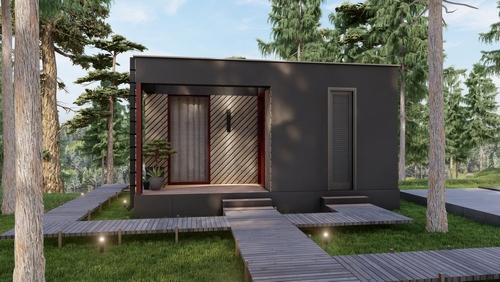Modular homes are transforming modern living with their cost-effectiveness, efficiency, and customizability. Constructed off-site and assembled quickly, these prefabricated homes provide high quality at a fraction of the cost of traditional construction, making them an attractive housing option.

What Are Modular Homes?
Modular homes are prefabricated houses built in sections, or modules, at a factory before being transported to the construction site for assembly. Unlike traditional homes, which are built entirely on-site, modular homes are manufactured in a controlled environment, ensuring consistent quality and quicker production times.¹
Once the modules arrive at the designated location, they are assembled on a permanent foundation, just like traditionally built homes. Modular homes offer a wide range of customization options, including various floor plans and design choices to meet individual preferences. They must comply with the same local building codes and standards as site-built homes, ensuring safety and durability.
Additionally, the modular construction process minimizes waste and reduces building costs, making it an efficient and appealing housing solution. Whether you’re seeking a compact home or a multi-story property, modular homes provide flexibility and affordability without sacrificing quality.
Benefits of Choosing a Modular Home
Modular homes come with numerous advantages, making them an increasingly popular choice in the UK. A key benefit is affordability; built in factories, these homes take advantage of bulk material purchases and streamlined construction processes, leading to lower overall costs.²
Moreover, modular homes can be constructed in a shorter timeframe, allowing homeowners to move in more quickly compared to traditional homes. They are also highly customizable, offering buyers the freedom to select various floor plans, layouts, and finishes that match their lifestyle.
Energy efficiency is another significant advantage—modular homes are often constructed with sustainable materials and feature modern insulation and energy-efficient windows, helping to lower utility bills. The controlled factory environment also ensures a high level of quality control, reducing the likelihood of construction errors. Furthermore, they generate less waste and have a smaller environmental footprint, making them an eco-friendly choice.
Considerations When Choosing a Modular Home
When selecting a modular home, several factors should be considered to ensure it meets your specific needs. Begin by determining the size and layout required. Modular homes are available in various sizes, from small cottages to large multi-story houses, so think about your family’s current and future needs.
Next, assess the available floor plans and customization options. Many manufacturers allow you to choose interior finishes, room configurations, and even exterior designs.
Budget is also a crucial factor; while modular homes are generally more affordable than traditional homes, the final cost can vary based on the level of customization and additional features. Ensure the land where your modular home will be placed is suitable for installation and complies with local zoning laws. Finally, research different modular home manufacturers and read reviews to find a reputable company with a strong track record for quality and customer service.
Financing and Installation Considerations
Financing a modular home is similar to financing a traditional home, but there are some key differences to keep in mind. Many banks and mortgage lenders offer loans specifically for modular homes, but it’s essential to ensure the lender is familiar with the modular construction process.
You may need two types of loans: one for the construction phase and a standard mortgage once the home is assembled on the foundation. Installation is another important consideration, as the land must be properly prepared before the home is delivered. This includes ensuring the foundation is built, utilities are connected, and any necessary permits are obtained.
Modular homes typically arrive 80-90% complete, but final touches like roofing and exterior finishes will need to be completed on-site. By carefully planning your financing and installation, you can ensure a smooth process from start to finish, making your modular home a stress-free and cost-effective investment.
Discover More About Modular Homes
Modular homes offer a cost-effective, customizable, and environmentally friendly alternative to traditional housing. With their quick construction times, high-quality materials, and energy-efficient designs, they provide excellent value for those looking to build their dream home.
By understanding the benefits, considering factors like size and layout, and planning your financing and installation, you can make an informed decision that fits your needs and lifestyle. Learn more about modular homes to see how this innovative construction approach can help you achieve modern, affordable living without compromising on comfort or style.

